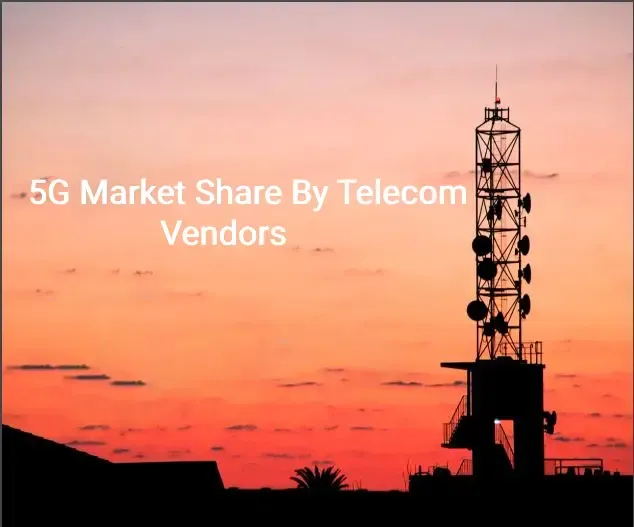Currently Huawei, Ericsson, and Nokia are the leading vendors in the 5G market. These companies dominate the industry, having secured significant global shares.
Exploring the competitive landscape of the 5G market reveals a fierce battleground for telecommunication supremacy. At the forefront, Chinese giant Huawei has established a substantial footprint despite facing challenges in various markets due to security concerns. Swedish multinational Ericsson closely follows, benefiting from its early investments in 5G research and development.
Finnish competitor Nokia also holds a critical position, leveraging its extensive portfolio of 5G solutions. While these three vendors lead the pack, other players like ZTE and Samsung are making inroads, capitalizing on regional growth opportunities and evolving technology standards. As the demand for high-speed, low-latency networks escalates, these vendors intensify their efforts to innovate and secure partnerships with carriers worldwide, shaping the future of 5G connectivity.
The Landscape Of 5g Technology
As we step into the future of connectivity, the landscape of 5G technology unfolds with rapid advancements and a dynamic market share among telecomm vendors. This leap in mobile network technology brings transformative changes across various industries, uplifting the way we communicate and interact with the world.
Evolution From 4g To 5g
The move from 4G to 5G is more than just a step up in speed. It marks a fundamental shift that opens doors to new possibilities. Here's a glimpse into this transformation:
- Improved bandwidth: 5G offers vastly greater data capacity.
- Lower latency: It reduces the response time significantly.
- Enhanced connectivity: More devices can connect without compromising performance.
Key Features And Advancements
5G technology stands on the pillars of its key features and advancements. Below is a breakdown of what sets 5G apart:
| Feature | Advancement | Impact |
|---|---|---|
| Speed | Up to 100 times faster than 4G | Enables real-time data transfer |
| Latency | As low as 1 millisecond | Supports critical applications like autonomous driving |
| Density | Supports one million devices per square kilometer | Fuels IoT and smart city development |
| Reliability | Near 100% uptime | Essential for health and safety systems |
| Spectrum Efficiency | More data transmitted over the same bandwidth | Maximizes network capacity and efficiency |
Leading Players In The 5g Arena
The 5G landscape is bustling with activity as leading telecommunication vendors race to establish their dominance in the market. Understand the key players powering this next-gen wireless revolution right here.
Market Leaders And Their Dominance
Several companies have carved out substantial portions of the 5G market share. Here's a highlight of the top players:
- Ericsson: A pioneer in 5G networks, offering end-to-end solutions.
- Huawei: Despite challenges, Huawei leads in global market share.
- Nokia: Focused on the integration of AI with 5G.
- Samsung: Expanding 5G infrastructure with major contracts worldwide.
- Qualcomm: Key supplier of 5G chipsets for mobile devices.
These companies' technologies enable lightning-fast data speeds, reduced latency, and mass connectivity.
Emerging Contenders And Innovators
New entrants and innovative startups are also shaping the 5G domain:
- ZTE: Rapidly emerging with robust 5G solutions.
- Cisco: Known for its powerful 5G infrastructure components.
- Intel: Designing critical 5G chipset technology.
- NEC: Focusing on customized 5G systems.
- VMware: Software-based 5G solutions for versatility.
These companies are integral to the expansion and efficiency of 5G networks, driving future innovations.
Critical Analysis Of Market Shares
The 5G landscape is rapidly evolving, with telecommunication vendors battling for dominance. A critical analysis of market shares reveals a dynamic and fiercely competitive arena. As we navigate through this sophistication, understanding the intricacies becomes essential.
Statistics And Trends
- Vendor A currently holds the largest share with 40%.
- Vendor B follows closely with a 30% market presence.
- Emerging players carve out niches, collectively taking 30%.
- Technological innovation: Creation of advanced 5G technologies sets vendors apart.
- Strategic partnerships: Collaborations with governments and businesses expand market reach.
- Brand reputation: Vital for gaining trust and driving user adoption.
- Global reach: Establishing a presence across multiple regions strengthens market share.
Sectorial Transformations
- Manufacturing: Enables real-time monitoring and automated workflows.
- Healthcare: Facilitates telemedicine and remote patient monitoring.
- Automotive: Enhances vehicle-to-vehicle communication for safer transportation.
- Entertainment: Improves streaming experiences with high-speed downloads and low-latency.
| Year | Expected 5G Penetration | Anticipated Market Value |
|---|---|---|
| 2025 | Over 1.7 billion subscriptions | $250 billion |
| 2030 | Widespread global coverage | Exceeding $1.5 trillion |
The 5G landscape is rapidly evolving, with telecommunication vendors fiercely competing for market dominance. Key players are pushing the boundaries of connectivity, shaping a future rich in innovation. Staying informed on these market shares is crucial for investors and industry stakeholders.
The 5G market is witnessing a significant transformation. Statistics showcase this evolution with a few vendors emerging as leaders. Trends suggest an uptick in adoption rates and infrastructure development.
User demand and technological advancements also dictate these trends, as seen in the burst of 5G devices.
Several factors influence how vendors position themselves within the 5G market. Key elements include:
Understanding these factors sheds light on the current standings and the future trajectory of vendors in the 5G space.
The arrival of 5G technology promises revolutionary changes across various sectors. Its unprecedented data speeds and reliability enhance user experience and operational efficiency. With 5G, both consumers and industries stand on the brink of a connectivity evolution. This technology extends beyond improved mobile broadband. It powers vast IoT ecosystems, enabling smarter cities and industries.
5G impacts numerous industry sectors by offering advanced connectivity. Transformations include:
5G's influence will likely accelerate over time. Here are predictions for its market growth:
These trends suggest that 5G will be a key driver of economic growth. It indicates vast opportunities for telecommunications vendors. Steep investments in the sector fuel continuous innovation and expansion.
Embrace the 5G revolution and witness the transformation it brings to our world.





